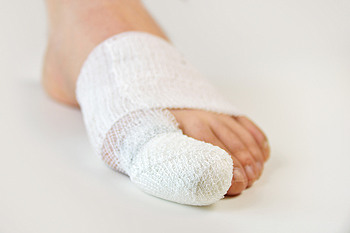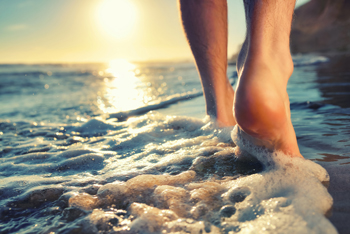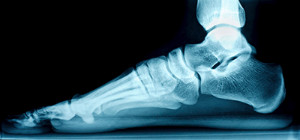Items filtered by date: July 2021
Risk Factors for Foot Stress Fractures
 A stress fracture refers to a tiny crack in a bone that may happen when the bone can no longer bear the load placed on it. Foot stress fractures often affect athletes, who place a great deal of stress on their feet. Foot fractures also commonly affect women. This is thought to be due to fluctuating hormone levels weakening the bones. Teens are also at an increased risk of stress fractures, as they often have high activity levels and bones that are still in the process of growing. Osteoporosis, abnormal foot biomechanics, or having had a previous stress fracture can all make another stress fracture more likely to occur, as can wearing shoes that don't properly fit or support the foot. If you are experiencing pain, swelling, or tenderness in your foot, it is suggested that you seek the care of a podiatrist as soon as possible.
A stress fracture refers to a tiny crack in a bone that may happen when the bone can no longer bear the load placed on it. Foot stress fractures often affect athletes, who place a great deal of stress on their feet. Foot fractures also commonly affect women. This is thought to be due to fluctuating hormone levels weakening the bones. Teens are also at an increased risk of stress fractures, as they often have high activity levels and bones that are still in the process of growing. Osteoporosis, abnormal foot biomechanics, or having had a previous stress fracture can all make another stress fracture more likely to occur, as can wearing shoes that don't properly fit or support the foot. If you are experiencing pain, swelling, or tenderness in your foot, it is suggested that you seek the care of a podiatrist as soon as possible.
Stress fractures occur when there is a tiny crack within a bone. To learn more, contact Dr. Joshua David Scoll from Pennsylvania. Our doctor can provide the care you need to keep you pain free and on your feet.
How Are They Caused?
Stress fractures are the result of repetitive force being placed on the bone. Since the lower leg and feet often carry most of the body’s weight, stress fractures are likely to occur in these areas. If you rush into a new exercise, you are more likely to develop a stress fracture since you are starting too much, too soon. Pain resulting from stress fractures may go unnoticed at first, however it may start to worsen over time.
Risk Factors
- Gender – They are more commonly found in women compared to men.
- Foot Problems – People with unusual arches in their feet are more likely to develop stress fractures.
- Certain Sports – Dancers, gymnasts, tennis players, runners, and basketball players are more likely to develop stress fractures.
- Lack of Nutrients – A lack of vitamin D and calcium may weaken the bones and make you more prone to stress fractures
- Weak Bones – Osteoporosis can weaken the bones therefore resulting in stress fractures
Stress fractures do not always heal properly, so it is important that you seek help from a podiatrist if you suspect you may have one. Ignoring your stress fracture may cause it to worsen, and you may develop chronic pain as well as additional fractures.
If you have any questions, please feel free to contact one of our offices located in Philadelphia, Bensalem, and Fairless Hills, PA . We offer the newest diagnostic and treatment technologies for all your foot care needs.
Do Your Child's Feet Hurt?
Gout in the Big Toe
Gout is a type of arthritis caused by a buildup of uric acid in the bloodstream. Uric acid can crystallize and lodge in the joints, leading to painful gout flare ups. One of the most frequent sites for a gout flare up is the big toe joint. Gout in the big toe typically causes intense throbbing and burning joint pain, which occurs with a sudden onset, often in the middle of the night. The pain may be accompanied by swelling, tenderness, warmth, and redness, as well as difficulty moving the big toe. All of this can interfere with walking or standing and going about your daily activities. Gout may flare up once, or could become a chronic condition and lead to permanent joint damage. If you have experienced a gout flare up in your big toe or anywhere else in your feet, it is suggested that you are under the care of a podiatrist.
Gout is a foot condition that requires certain treatment and care. If you are seeking treatment, contact Dr. Joshua David Scoll from Pennsylvania. Our doctor will treat your foot and ankle needs.
What Is Gout?
Gout is a type of arthritis caused by a buildup of uric acid in the bloodstream. It often develops in the foot, especially the big toe area, although it can manifest in other parts of the body as well. Gout can make walking and standing very painful and is especially common in diabetics and the obese.
People typically get gout because of a poor diet. Genetic predisposition is also a factor. The children of parents who have had gout frequently have a chance of developing it themselves.
Gout can easily be identified by redness and inflammation of the big toe and the surrounding areas of the foot. Other symptoms include extreme fatigue, joint pain, and running high fevers. Sometimes corticosteroid drugs can be prescribed to treat gout, but the best way to combat this disease is to get more exercise and eat a better diet.
If you have any questions please feel free to contact one of our offices located in Philadelphia, Bensalem, and Fairless Hills, PA . We offer the newest diagnostic and treatment technologies for all your foot and ankle needs.
The Effects of Excessively Sweaty Feet
 Plantar hyperhidrosis is a medical condition that causes the feet to sweat excessively. An overabundance of sweat can make the skin of the feet break down, become pale and wrinkled, red and inflamed, or cracked. The feet may also emit a foul odor as sweat is broken down by bacteria. Excessive sweat can ruin shoes and socks, make you more likely to slip and fall, and be embarrassing in public. Fortunately, plantar hyperhidrosis can be treated effectively. Antiperspirants can be prescribed and applied directly to the skin to reduce sweating. Iontophoresis and botox injections into the feet are two other potential solutions. If you have excessively sweaty feet, it is suggested that you consult with a podiatrist to find the right treatment for you.
Plantar hyperhidrosis is a medical condition that causes the feet to sweat excessively. An overabundance of sweat can make the skin of the feet break down, become pale and wrinkled, red and inflamed, or cracked. The feet may also emit a foul odor as sweat is broken down by bacteria. Excessive sweat can ruin shoes and socks, make you more likely to slip and fall, and be embarrassing in public. Fortunately, plantar hyperhidrosis can be treated effectively. Antiperspirants can be prescribed and applied directly to the skin to reduce sweating. Iontophoresis and botox injections into the feet are two other potential solutions. If you have excessively sweaty feet, it is suggested that you consult with a podiatrist to find the right treatment for you.
If you are suffering from hyperhidrosis contact Dr. Joshua David Scoll of Pennsylvania. Our doctor can provide the care you need to attend to all of your foot and ankle needs.
Hyperhidrosis of the Feet
Hyperhidrosis is a rare disorder that can cause people to have excessive sweating of their feet. This can usually occur all on its own without rigorous activity involved. People who suffer from hyperhidrosis may also experience sweaty palms.
Although it is said that sweating is a healthy process meant to cool down the body temperature and to maintain a proper internal temperature, hyperhidrosis may prove to be a huge hindrance on a person’s everyday life.
Plantar hyperhidrosis is considered to be the main form of hyperhidrosis. Secondary hyperhidrosis can refer to sweating that occurs in areas other than the feet or hands and armpits. Often this may be a sign of it being related to another medical condition such as menopause, hyperthyroidism and even Parkinson’s disease.
In order to alleviate this condition, it is important to see your doctor so that they may prescribe the necessary medications so that you can begin to live a normal life again. If this is left untreated, it is said that it will persist throughout an individual’s life.
A last resort approach would be surgery, but it is best to speak with your doctor to find out what may be the best treatment for you.
If you have any questions please feel free to contact one of our offices located in Philadelphia, Bensalem, and Fairless Hills, PA . We offer the newest diagnostic and treatment technologies for all your foot and ankle needs.
My Child's Foot Is Asleep
Foot numbness in children is frequently caused by a compression of the nerves in the foot following a period of sitting with the legs or feet tucked underneath the body. The term for this is the foot “falling asleep.” Though your child may feel a pins and needles sensation, heaviness, or pain in their feet upon standing, this is nothing to worry about and tends to go away within minutes as the foot “wakes up.” Nevertheless, there are other possible causes of foot numbness, such as injuries to the feet or ankles, that you should watch out for. If your child complains of frequent foot pain or numbness that interferes with their daily activities or gets worse over time, it is suggested that you take your child to see a podiatrist.
The health of a child’s feet is vital to their overall well-being. If you have any questions regarding foot health, contact Dr. Joshua David Scoll of Pennsylvania. Our doctor can provide the care you need to keep you pain-free and on your feet.
Tips for Keeping Children's Feet Healthy
- Make sure their shoes fit properly
- Look for any signs of in-toeing or out-toeing
- Check to see if they have Clubfoot (condition that affects your child’s foot and ankle, twisting the heel and toes inward) which is one of the most common nonmajor birth defects.
- Lightly cover your baby’s feet (Tight covers may keep your baby from moving their feet freely, and could prevent normal development)
- Allow your toddler to go shoeless (Shoes can be restricting for a young child’s foot)
- Cut toenails straight across to avoid ingrown toenails
- Keep your child’s foot clean and dry
- Cover cuts and scrapes. Wash any scratches with soap and water and cover them with a bandage until they’ve healed.
If you have any questions, please feel free to contact one of our offices located in Philadelphia, Bensalem, and Fairless Hills, PA . We offer the newest diagnostic and treatment technologies for all your foot care needs.
Why Are My Feet Flat?
 If your feet have no visible arch when standing, you’re not alone. Flat feet are common, affecting an estimated 12% of the US population. The majority of infants are born with flat feet and have an arch that develops over time. However, this does not happen for everyone. For reasons that are currently unknown, but that likely have to do with genetics and environmental factors, some people never develop an arch. It is also possible to develop an arch normally and then lose it over time. This collapse of an existing arch is known as acquired flat foot or fallen arches and is thought to be caused by the aging process and a degeneration of the tissues that support the foot and ankle. Acquired flat foot has also been linked to pregnancy. While feet that are flat from birth usually don’t cause any pain or discomfort, acquired flat feet often do. If you are experiencing any foot pain, it is suggested that you seek the care of a podiatrist.
If your feet have no visible arch when standing, you’re not alone. Flat feet are common, affecting an estimated 12% of the US population. The majority of infants are born with flat feet and have an arch that develops over time. However, this does not happen for everyone. For reasons that are currently unknown, but that likely have to do with genetics and environmental factors, some people never develop an arch. It is also possible to develop an arch normally and then lose it over time. This collapse of an existing arch is known as acquired flat foot or fallen arches and is thought to be caused by the aging process and a degeneration of the tissues that support the foot and ankle. Acquired flat foot has also been linked to pregnancy. While feet that are flat from birth usually don’t cause any pain or discomfort, acquired flat feet often do. If you are experiencing any foot pain, it is suggested that you seek the care of a podiatrist.
Flatfoot is a condition many people suffer from. If you have flat feet, contact Dr. Joshua David Scoll from Pennsylvania. Our doctor will treat your foot and ankle needs.
What Are Flat Feet?
Flatfoot is a condition in which the arch of the foot is depressed and the sole of the foot is almost completely in contact with the ground. About 20-30% of the population generally has flat feet because their arches never formed during growth.
Conditions & Problems:
Having flat feet makes it difficult to run or walk because of the stress placed on the ankles.
Alignment – The general alignment of your legs can be disrupted, because the ankles move inward which can cause major discomfort.
Knees – If you have complications with your knees, flat feet can be a contributor to arthritis in that area.
Symptoms
- Pain around the heel or arch area
- Trouble standing on the tip toe
- Swelling around the inside of the ankle
- Flat look to one or both feet
- Having your shoes feel uneven when worn
Treatment
If you are experiencing pain and stress on the foot you may weaken the posterior tibial tendon, which runs around the inside of the ankle.
If you have any questions please feel free to contact one of our offices located in Philadelphia, Bensalem, and Fairless Hills, PA . We offer the newest diagnostic and treatment technologies for all your foot and ankle needs.



